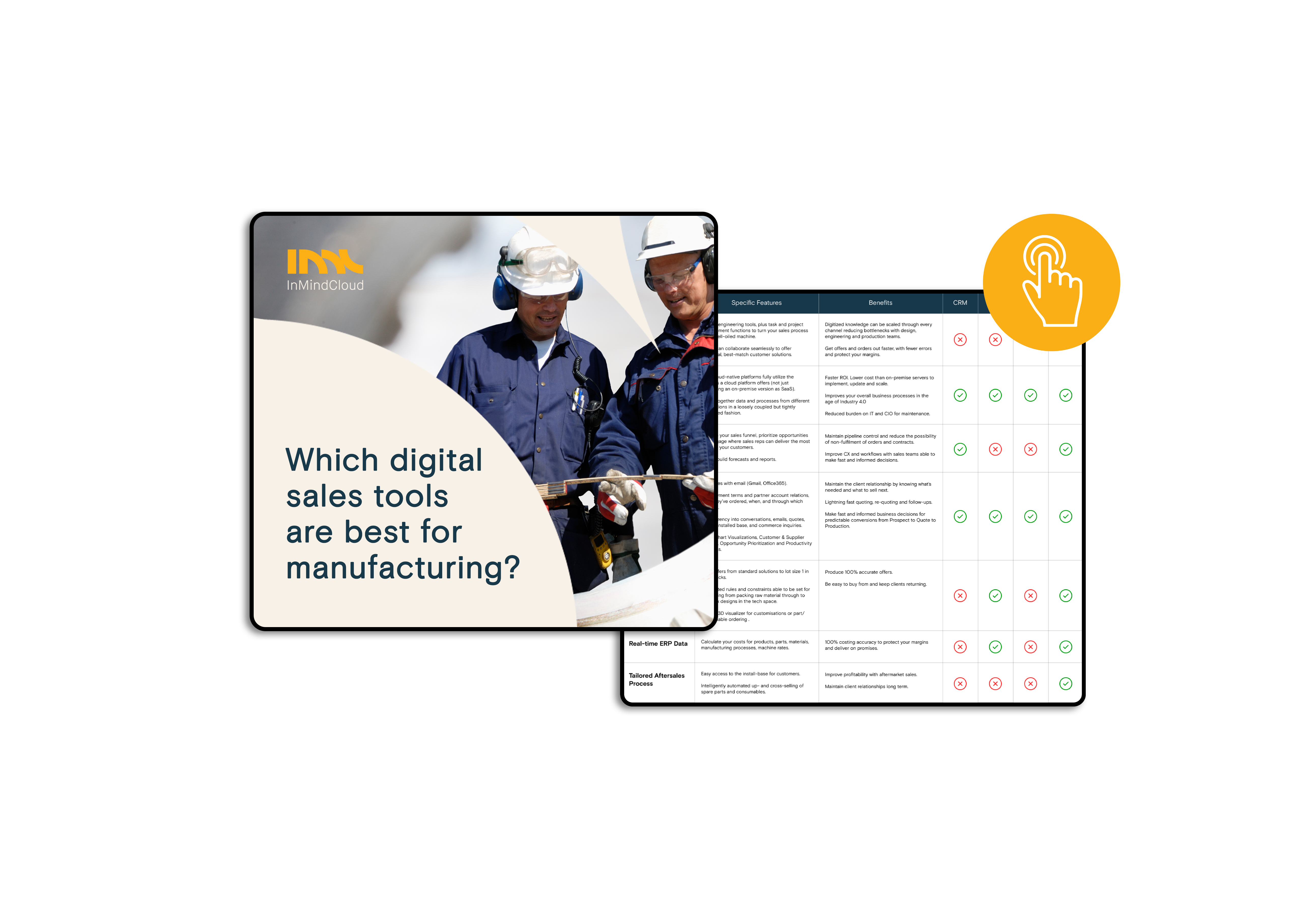In the manufacturing industry, the landscape has changed significantly. Your customers are adjusting to the speed and demands for convenience of their customers. Leading manufacturers are pivoting to meet this demand and invest in digitalizing their most critical operations: the sales and quoting process.
Cloud-based configure-price-quote (CPQ) tools can easily manage complex products, non-standard solutions, and intricate deals. To fulfill these goals the quoting solution needs high availability and scalability (i.e. cloud capabilities), deep integration with the manufacturer’s ERP, and the ability to be seamlessly embedded in becoming part of a digital eco-system that encompasses the entire sales process.
Accelerate your solution search with this CPQ Software Requirements Checklist. Use it to see what CPQ features your business needs, and what to focus on in your vendor search.
Typical features of a modern CPQ for manufacturing
Today, manufacturers need more than a CPQ that configures products. They need a CPQ that helps configure complete solutions, projects, or even contracts and deals—one that keeps up with evolving business models, and respects their unique industry requirements. They need a CPQ that manages their product and service catalog, offers smart selling, can deliver advanced costing, penny-perfect pricing accuracy, and visual configuration through CAD or maps.
Your manufacturing quoting tool should make selling complex or non-standard products and solutions easy.
A CPQ’s tight integration with your ERP is the basis to make all that possible. Your quotation solution can use all critical data from your engineering, supply chain, and product knowledge and make it available for everyone involved in the sales process. A CPQ also connects this information throughout all sales engagement touchpoints along the value chain.
This approach allows your digital sales platform (and by extension, global sales channels) to easily access the most updated prices, costs, catalogs, and variation options.
Besides simplifying the selling process, a CPQ also makes it more accurate—and cost-effective. This capability alone can make it indispensable for manufacturers who have been struggling with shrinking margins and increasing competition. With a CPQ in place, your sales teams—or partners—will always be ready to deliver 100% accurate RFQs and meet the tightest of deadlines to secure the most profitable deals.
These are just some of the key reasons a manufacturer should consider onboarding a progressive CPQ. However, you may have unique requirements that a general-purpose CPQ is not able to fulfill. In our Software Requirements Checklist, we compiled a comprehensive list of capabilities a manufacturing-focused CPQ should have. It also includes the granular features that can be critical to your manufacturing business.
Here is a list of primary features that your manufacturing-focused CPQ should have.
| Product & Service Catalog | Solution & Product Configuration Engine | Smart Selling |
| Visual Selection & Configuration | Variant Configuration | Price & Cost Calculation Engine |
| ERP Pricing | Terms & Conditions Management | Approval & Tender Collaboration |
| Quote & Proposal Management | Document Management | Inquiry Management |
| Order management | CRM Integration | Commerce Integration via API |
| Generic ERP/PM Integration | Channel Support | Scalability |
| Internationalization |
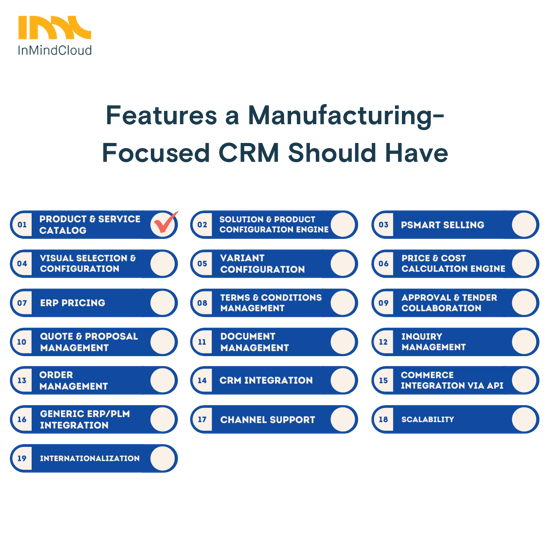
A CPQ built for manufacturing has many functions aimed at streamlining the RFQ process
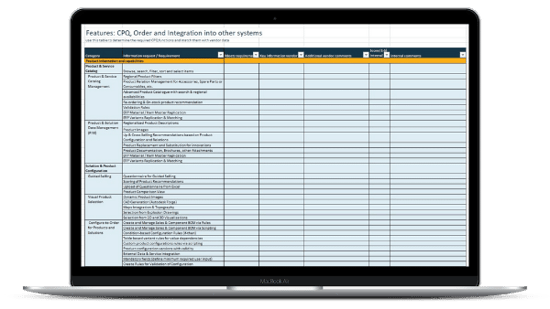
Our CPQ software requirements checklist also includes granular features your business may need
Identify the goals your CPQ needs to achieve
To find the right CPQ for your manufacturing business, you would first have to be clear on your business goals. Does your company want to protect margins threatened by global competition? Digitalize product knowledge to overcome a shortage of sales engineers? Or enable advanced 3D visual configuration to boost win-rates and improve customer experience? Knowing what your business needs from a CPQ helps you identify the key features and the level of customization needed.
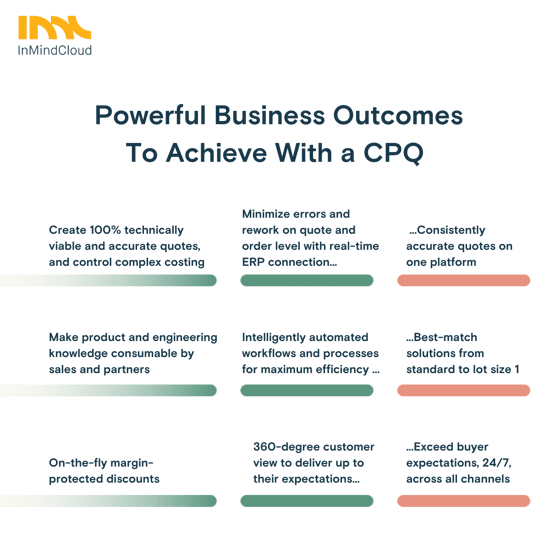
Find a best-fit CPQ for your manufacturing business by identifying your business goals
Here are the powerful business outcomes a CPQ integrated with your ERP can deliver:
Automated generation of consistently accurate quotes on one platform
- Create 100% technically viable and accurate quotes and control complex costing
- Minimize errors and rework on quote and order level with real-time ERP connection
Best-match customer solutions from standard to lot size 1
- Make product and engineering knowledge consumable by sales and partners
- Intelligently automated workflows and processes for maximum efficiency
Exceed buyer expectations, 24/7, across all channels
- On-the-fly margin-protected discounts
- Unburdened sales reps can entirely focus on customers
Who are the CPQ users in your manufacturing business?
A well-integrated CPQ can have a profound impact on your manufacturing business. Besides more accurate quotes, a CPQ can also reduce production errors—resulting in lowered costs across the board. However, a CPQ can also benefit other responsible stakeholders in your organization.
For example:
- Marketing can create personalized buying experiences and enticing deals based on account purchase history to offer the best-match configuration in a customer sales portal.
- Technical Support can use visual 2D and 3D selection tools in an integrated after-sales portal to guide customers to the matching spare parts and consumables.
- Engineering teams can collaborate on and design complex solutions fast and efficiently using built-in CAD tools.
- Sales Management can effectively prioritize the most profitable deals and steer collaboration with other departments, partners, or resellers during the RFQ process.
Identifying all potential users of a CPQ can help you solidify your sales digitalization approach, goals, and budget. By getting software that caters to your users' needs, you also ensure higher adoption rates.
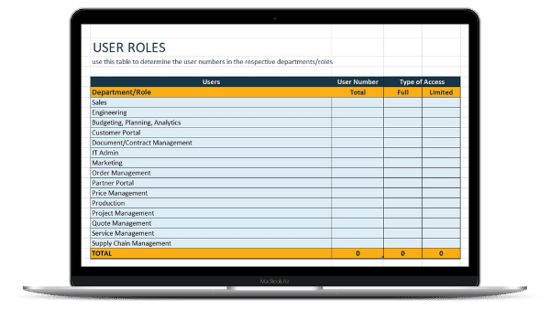
List of departments that could benefit from an advanced CPQ built for manufacturing
Extend the potential of CPQ beyond quote generation
Once you have identified the potential users, you can strategize on the CPQ’s role in your business. It is traditionally known to generate quotes quickly. But extending its effect throughout the customer journey and synchronizing it with other sales tools like CRM or Commerce can bring out its full potential in streamlining your entire sales process.
Imagine running your sales process as seamlessly and cost-efficiently as your production line: Automated workflows and approvals make sure your sales teams are collaborating efficiently with all stakeholders involved. A seamless connection to CRM data and 360-degree account view across all sales channels makes sure your teams are spending their time and energy where they are needed—on the most profitable deals.
If sales and partners can create best-matching, fully individualized offers—and deliver them in the customer’s preferred format in record time—your win rates will soar. And if your product and configuration knowledge extends to your webshop, partner portal, or spare parts online shop, you can seamlessly scale your sales success to an anywhere-anytime level.
No matter if customers are browsing 3D models of your products online. Walking through guided selling questionnaires together with your sales team. Or selecting spare parts from their personalized recommendations. Your customer’s experience can only be superior if your sales process is that well-oiled, hyper-connected machine. A digital platform is an ideal solution that can streamline and connect the entire buying journey to keep your customers returning and help your company build repeatable sales success.
Define your manufacturing CPQ requirements
Our checklist is put together with a focus on optimizing the end-to-end sales process. Working through the checklist will help you need to find your individually required CPQ features. It also helps you to identify additional capabilities needed to fully transform and align your sales process with your customer journey.
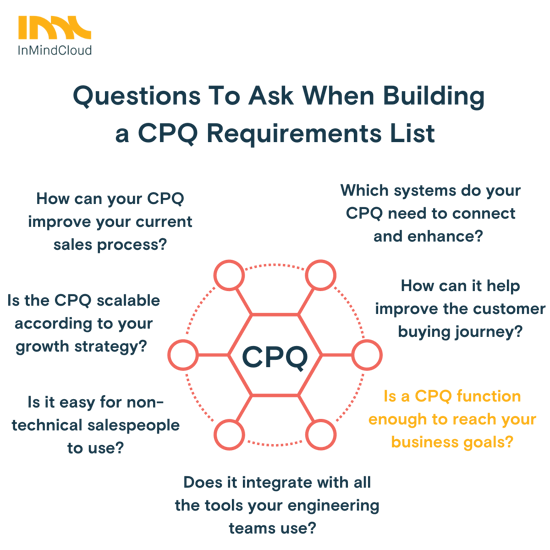
Some useful questions to ask yourself and your team when building a CPQ requirements list
Some questions to ask when refining your CPQ requirements list:
- How can a CPQ improve your current sales process?
- Which systems do your CPQ need to connect and enhance?
- Is the CPQ scalable according to your growth strategy?
- Is it easy for non-technical salespeople to use?
- Does it integrate with all the tools your engineering teams use?
- How can it help improve the customer buying journey?
- Is the CPQ function enough to help you reach your goals? (hint: it’s only part of the solution)
Send a CPQ feature compliance list to potential vendors
After asking critical questions about your CPQ’s goals and identifying the users, it’s time to define a selection team. This team would include decision-makers and users alike. The teams—like sales, engineering, after-sales, or marketing—that use the CPQ most should have the most input on ranking features of the CPQ software.
Once you have concluded what is most important to your business, you can quickly turn your requirements list into a compliance document and send it to potential vendors. Based on their replies, you can create a shortlist, and the selection team would then narrow down their choices and start negotiations. Keep an eye out for transparent pricing and business conditions to avoid being locked into a solution that may not deliver the promised results. Once the preferred vendor has been selected, the team would proceed to get buy-in from all stakeholders.
Conclusion: A careful CPQ software vendor selection pays off
Once you have selected your vendor—one that should ideally be a trusted digitalization partner—the next step of your digitalization journey can start. From here on, an implementation team should be assigned. This team would then start collaborating with the vendor to implement your digital sales solution. Your digitalization partner will help you maintain clarity on the expected ROI, fully map out your implementation approach, and guide you on the evaluation process.
The right partner with manufacturing expertise and experience will understand what digital sales success for your business looks like. They will be able to draw on their knowledge to guide you along the path to digital maturity.
To get a head start in your CPQ selection process, download our Software Requirements Checklist, and select from our pre-built CPQ feature list. This list is based on manufacturing industry standards and covers the needs of most manufacturing companies.
To get a head start in your Commerce selection process, you can always give our interactive software finder a try. All you need to do is answer a few questions, and we'll send you a personalized Digital Sales Software Comparison Checklist to help you find the right software for your business. The comprehensive feature list is based on manufacturing industry standards and covers the needs of most manufacturing companies.
We know that a CPQ is only one piece of the puzzle in your sales digitalization. That is why the checklist also includes features and capabilities for CRM and Commerce—key components in an effective digital sales solution for manufacturers.
Discover the must-have CRM features for manufacturers here.
Discover the must-have Commerce features for manufacturing here.
With this checklist, you can strategize on how to digitalize and align your customer journey and sales process. And meet your customers where they are, every step of the way. If you would like to have a deeper conversation about your challenges and digital sales requirements, you can always book a no-obligation consultation with our experts. We will be more than happy to walk you through how a modern sales solution built for manufacturing can help your business.

 Deutsch
Deutsch


